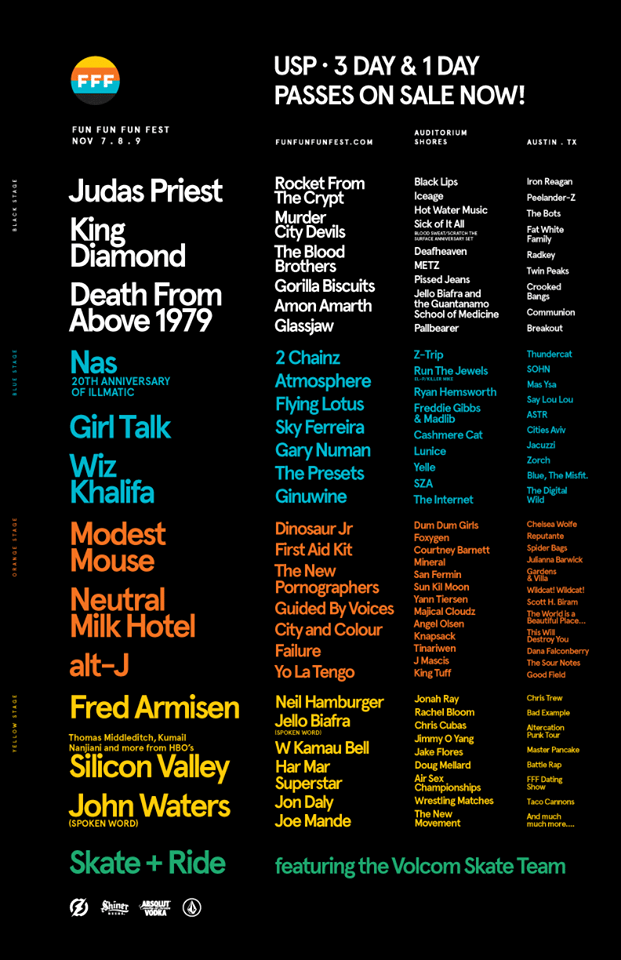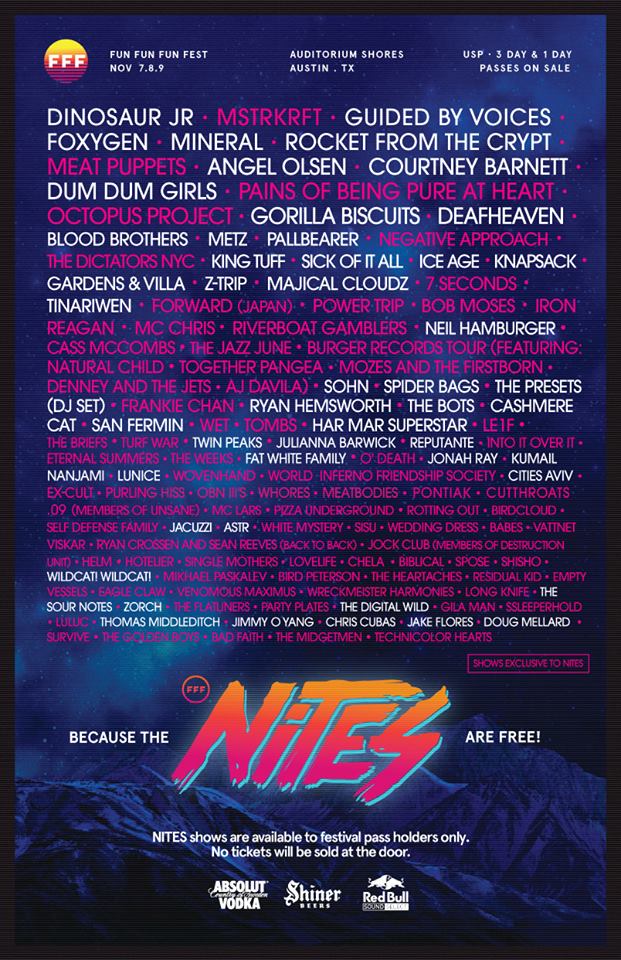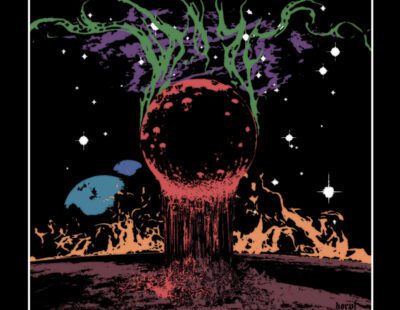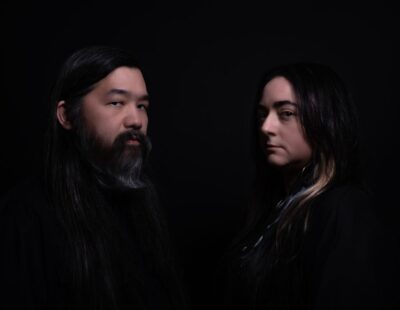Earlier this month, I re-introduced you to Graham Williams, the man essentially responsible for procuring the across-the-board talent for FunFunFunFest, the annual party that’s taken place in Austin each year of the past eight. Not only is Williams a prolific promoter/booker with a seemingly inexhaustible knowledge of what the hell is going on in every scene from extreme music and indie rock to hip-hop and stand-up comedy, the guy is probably the best sport of anyone who’s ever sauntered across the face of the earth. This, because as part of my interview with him this time around (you’ll recall I originally interviewed him about the origins of the festival last year here) he was gracious enough to directly address the variety of complaints that I culled after about 17 seconds of skulking around the FFFF Facebook page.
It’s like brides-to-be-on-their-wedding-days refuse to believe: no day will ever be 100% perfect; something is bound to go wrong at some point on any day. The same thing can be said when you plonk what amounts to the population of a small town into a confined space for a three-day weekend and try to satisfy everyone with four stages worth of varying musical and comedy acts and some alcohol. Add to that the public forum the internet provides for (un)warranted complaints and, well, we all know how these things work. Williams didn’t have to do this; he could have told me to fuck off, stop being such a negative Nelly and gone back to working on trying to convince Ice Cube to do a special and exclusive Predator/Death Certificate/AmeriKKKa’s Most Wanted set for next year’s fest, but he took to the time to tackle some of the issues that the public have with the fest. So, let the games begin!
There were a number of complaints about the sound at the Black Stage last year, and while I didn’t do my bitching on-line, I gotta say the sound was really spotty at times.
Sound is a constant struggle, but I think we do a pretty good job. We hire a really good sound company and most of the bands sound really great. There were a few bands – it seems like there are a few bands every year – that didn’t sound so great and I don’t know if it’s the sound person or if it’s an issue with the sound company, but it gets brought up at 10:01pm each day when we’re emailing the sound company going, “What happened? Why did it sound like this? What can you do to fix this for tomorrow?” You definitely notice it when it happens and it’s really frustrating, but also sometimes you have to deal with the city. Last year, there were a few mistakes made on their end where some of the sound enforcement folks came down and were talking to some of the sound people without the correct information, but that was sorted by the next day. They were probably coming by and telling people to turn it down when we weren’t actually over the decibel limit. That kind of stuff happens, but you take note of it, work through it, try and plan around it for the future and take our meetings with the city and sound folks and make sure we’re all on the same page for the next year. But it’s tough and there are those moments throughout the festival where things drop off and sometimes there are reasons, sometimes there aren’t. More often than not, there’s a touring sound person who isn’t used to doing festivals; they’re more used to mixing in a club or small venue and then they’re on a festival soundboard and they don’t know where they can push it and everyone’s looking at the festival, but we can’t control what a touring sound person does for any one band and that’s why you’ll notice major differences between one band and the next band because there will be two different sound guys.
So, is the side-by-side stage set up with bands playing back-to-back dead in the water?
Yeah. That was for a few reasons, mainly production. Essentially, I liked it: we could fit more bands; it kept the flow going back and forth; and there were shorter breaks between bands. But, a lot of the bands started having issues with it and we just ceded to them. Basically, what happened was we had a really short set changeover and if a band plays for 45 minutes, the band coming on next has 45 minutes to set everything, but they only had a quick little five minute window to line check everything and get started. So, if there’s a mistake or an issue or the wrong equipment is set up, there’s no time to fix it. If a band ended up throwing things off by 15 minutes that would throw off the entire rest of the day because there were never breaks between bands to catch up. So, there were times headliners or bigger bands in the middle of a bill got cut short. We decided it was in the band’s best interests to give everyone long set changes. Now, we have one stage and everyone has 20-30 minutes to get everything broken down, set up, sound checked and it just makes it easier on everyone. Like I said, I liked the back-to-back stages. I always played in punk and hardcore bands growing up and we never had any time to set up, but now we’re sometimes dealing with bands who are used to their own soundboards or bands who’ve flown in from Europe or wherever or bands who are used to having an hour to set up before they even check a note and you’re trying to rush them in five minute windows and it’s not really possible for a lot of bigger bands. In the end, it’s worked out. I mean, we got rid of one good thing, but everything’s runs a lot smoother since we did that and the bands are a lot happier.
There was a lot of commentary about the price increase. I mean, I get it: no one likes to pay for anything, but you need more money to attract names and that money is primarily going to come from admissions.
We raised it a little, not a lot. If you do the math, it was something like 10% or something small like that. I think it was $179/$180 for a weekend pass last year, and this year it’s $195. So, we raised it $15, which is less than 10%, more like 8%.
What’s the business model behind a price increase?
For us, it always hasn’t been so strategic. To be honest, we actually haven’t raised it in years when we probably should have. When we first moved to the new park, we were like “We don’t want to raise it because it’s going to be at a new park and everything is going to be a shock to everyone.” We added a third day, so there was that increase, but it increased proportionally per day. The next year, it was the same thing. We rolled in all the taxes and fees so there wouldn’t be any hidden prices so when you go to check out that’s what you pay; it’s all-in pricing and what you see is what you get. We actually didn’t raise it for three or four years, but this year we were so far behind. Most festivals raise them every year a little bit and we never did. I think it was because there were so many changes and we didn’t want the die-hard fans to feel taken advantage of, but in the end we were like, “We’re going to spend a whole lot more money this year on talent.” We want to get bigger bands, everyone wants to see bigger bands and everyone asks for bigger bands. Every year no one says, “You really should book this obscure band no one’s heard of whose split 7” I have ‘cuz that’s all I want to see.” People are always like, “Dude, when are you going to book Judas Priest?” Well, Judas Priest costs five times what the headliner cost two years ago. But, like I said, it’s a pretty nominal increase. The single-day tickets went from $75 or $79 to $85 and the weekend pass went up $15. That little amount times thousands of people adds up to enough to get bigger acts and this year across the board we booked bigger bands. The money just goes into bigger talent which hopefully sells more tickets, but we never know until the day of the show if we achieved our goal.
This next point doesn’t apply to me because I don’t drink, but there were a few negative comments about the beer selection and people also complaining about long beer lines. I personally don’t care about beer in the slightest, so I wouldn’t know about any of this, but have you heard this complaint before?
No! That’s actually surprising and almost hard to believe! I don’t know, that’s crazy and it’s crazy how short the lines are with our system. There might have been a few key bars that were busy during certain peak hours. I do know that Shiner tried to do a craft beer thing and it was really small. Maybe that had a line? The generic bar lines and pop-up tents that are all over the festival have iPad systems and tons of bartenders who aren’t just random people; they hire bartenders from all over town who work at venues, so they are people who work pretty quickly. But, there were probably some moments like before a headliner where everyone goes during the half-hour changeover to get their beer so they don’t lose their spots. I would imagine those times had some peaks. Typically, every year we’ve gotten better and if there are a few moments where, say, they notice a problem on Friday, things are run pretty tight and the next day they get eight more people for that bar so they don’t have the same line-up problem the next day. But if someone complains about it, it’s on the internet forever, even if that person is happy the next day. Beer selection? We’re pretty stoked about it and on social media people have been really, really happy. In the past, people have been kind of stuck with whoever sponsors the festival and we’ve had some sponsors in the past that some people aren’t into. I also don’t drink, so it doesn’t matter to me, but I hear people’s complaints. We had Heineken sponsoring for a couple years in a row. This past year we have Shiner which is a super popular Texas beer and is kind of crafty in itself and is locally made. Having that, everyone – the drinkers anyway – was excited about because they didn’t get a cheap beer or a beer they would never order, they got something they like. So, we’re pretty happy about that and the people who work at Shiner are really cool; they like cool music, they like what we do, the head guy of their marketing team is super into metal, so he’s always stoked about our Black Stage and are always down to do fun, promotional things to help spread the word.
The next complaint is also something I don’t have any experience with, but there was some complaining about the VIP area “not being worth it.” I’ve never taken part in any of FFFF’s VIP experience, but what say you about this?
VIP is tough because we’re not dealing with your typical VIP people. At other festivals, they’ll charge $1000 for a VIP ticket. We can’t, in our good graces, do that and our customers won’t pay it anyway. We just don’t feel comfortable doing it. Other festivals will do it and they’ll have lounge chairs and guys giving massages and free salad imported from France or some shit. For a thousand dollars a ticket, you do get what you pay for. For us, we’re only charging people not even double what a regular ticket is and literally every penny of the up-mark goes back into the experience. So, it’s like we’re offering it so people have a choice, but it’s not something we make money off of. But we do a lot of stuff for the VIP/backstage area and the idea is there are more places to sit, there are no lines for food or beer or bathroom; it’s kind of the area you can kind of get away and have a better experience. There are view decks so you can have a special area to watch the band and you don’t have to fight through the crowd. The biggest complaint last year, which was very understandable but something we had pull back on, was that we used to do free beer. Financially, it didn’t make sense. We were killing ourselves giving away alcohol to everyone. It started as a small thing, like, “We’ll do a couple hundred VIPs and put our friends there.” Then, everyone started buying because, obviously, it’s free beer and as long as you drink enough you’ve saved money by the end of the weekend. We couldn’t keep up with it, but more importantly there were a lot of legal issues we found out about with giving away alcohol and selling a ticket that includes free alcohol. You have to do a different licensing thing with the way the liquor laws are and the only other option was to get rid of liquor at the festival and only do beer to be able to do it, but we’re one of the only festivals that sells liquor and that’s always been an interesting bonus. So, we decided it didn’t make financial sense and we didn’t think that’s what the festival was supposed to be. It’s supposed to be this fun event and if you want to pay a little bit more to have a nicer experience, we’d love to give that to you, but that was the one thing we had to cut out and we were also at the point of breaking the law to a degree; or there was some grey area and we didn’t want to keep pushing it and end up not being able to do the festival properly just so people could have free beer in the VIP section. For me, I’ve always not been sure even if we should do VIP. I don’t like the idea there’s a separate area for anyone; that’s not what our festival is about and our VIP section is totally different than the Lollapalooza VIP section. Every year we add new things and I think this year people will be happy with it. We’ve come up with a lot of ideas that we think VIPs will be happy with. Every year, even though there are complaints – and I understand the no free beer thing – we sell more than the year before. Those are just the loudest voices, which I understand because rarely do people go online to talk about how great anything is. They’ll always going online to complain about stuff, which I do too. I never go online to a restaurant I like and say, “You guys make the best nachos and I appreciate it” but I would if the nachos were terrible and the guy was an asshole.
Next, a bunch of complaints about the Comedy Stage/Tent: where it was placed; the sound bleed from the main stage; the actual size of the tent.
Yeah, that was a major fuck up on our part. Basically, we had always done it in a different section, but as it was growing, it wasn’t possible to fit in that area. So, our production guy did some measurements and tested out some sound proofing stuff he saw at Coachella and some other festivals and thought it was possible to do it in that one big giant area that we weren’t using and it didn’t really work. Also, the comedy acts we booked last year were too big to accommodate that tent, which we couldn’t really do much about. We got every big act who was playing to do a night show – Tenacious D, Sarah Silverman and everyone else – to offset if you couldn’t get in, you could go to the clubs, but even still…this year, we kind of booked more around the size with John Waters, Fred Armisen, Jello Biafra and tried to do as many comic and spoken word acts that we thought could fill that. The placement has definitely been on our minds. This year with the new location, I’m pretty confident it’s going to be a lot better; it’s not longer across the stage; it’s to the side of where all the stages are, so we don’t think there’s going to be any bleed. There might be some, but it’s tough when it’s spoken word. You’re always going to hear some drums and bass in the background somewhere, but it’s going to be better than before. Last year, we tried something different to accommodate the audience, but there was way too much bleed and we had to learn the hard way.
Something I’ve always wondered about was the a screen behind the comedy stage: why not get a camera and project the comedian on the screen during his/her routine?
Yeah, we talked about that too. The projection was more for certain comics who needed it as part of their bits or some of the bands – there are always bands after the comedy ends – to use. It’s more of a functional thing. This year we had talked about having a single camera so anyone in the back can still see the comic. It sort of depends on how we set it up this year, but I think that’s a pretty good idea and I don’t really see any reason not to. You’re already fighting against music and trying to get a single voice to be heard for an entire crowd, you might as well make it so you can at least see them. It’s not too much of a cost to bring in a camera person and do that, it’s just a matter of making work.
And lastly, I noticed that Volcom is redesigning the skate and BMX area. Was that the result of complaints from the skaters/riders/fans?
Not really, it’s more that it started out with a guy we knew who had a skate shop was like, “Can I bring my ramp and some of the dudes who work here will skate it?” and we were like, “Yeah, sure.” Every year it got bigger and now it’s fucking massive and pros are being flown in from all over, but there’s no sponsor, we’re paying for it out of pocket. It’s not like you’re buying tickets to see Christian Hosoi, you’re buying tickets to a music festival and the skate and ride is a hugely important part that we’ve really embraced, so we wanted a partner who could really take it to the next level and do something for us that we admittedly don’t know as much about. We’ve had this local partner, Project Loops, a non-profit that helps with some of the riders and some of the design. They’re great, but it’s not a big company. We wanted someone who could really get behind it where we have our limits. We know a lot about music, and some of the guys who work here know a lot about skating and riding, but Volcom literally has an entire skate team and department. They used to have a label and some of their bands have played and they have had their tents set up. I think they wanted to get more into the festival world and promoting their clothing and we really like what they do – they want to do a special t-shirt series around some of the acts that are playing, which no one really does – and we’re really happy to have someone in that world be a part of it.
FunFunFunFest 9 runs November 7-9. For info and tickets and all that sort of thing, check out www.funfunfunfest.com








